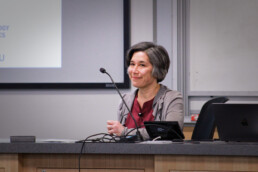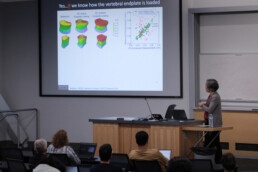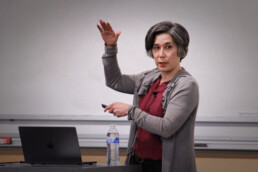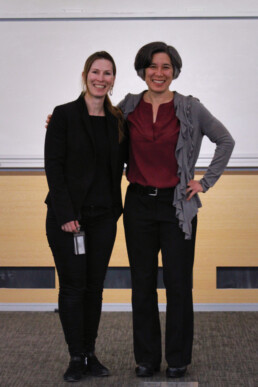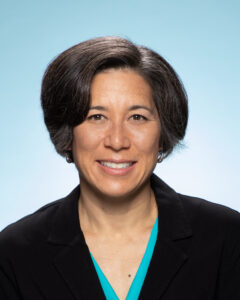 Elise F. Morgan
Elise F. Morgan
Maysarah K. Sukkar Professor of Engineering Design and Innovation
Mechanical Engineering, Biomedical Engineering, Materials Science and
Engineering, Orthopaedic Surgery
Boston University
Friday, Apr. 21st at 3pm
Room 3550 MEK
Sid & Marian Green Classroom
Abstract: Spine fractures are the hallmark of osteoporosis, affecting one in three women and one in five men over the age of 50. Yet how these fractures occur and what factors affect the likelihood of fracture remain poorly understood. Our laboratory has developed a method of 3-D, quantitative visualization of the initiation and progression of spine fractures. This method uses volumetric digital image correlation (VDIC; or digital volume correlation (DVC)) to analyze time-lapse sequences of high-resolution computed tomography images of spine segments undergoing loading. Over multiple series of experiments, we have identified microstructural and anatomical features that are associated with initiation and propagation of failure. Interestingly, a characteristic length is observed in the deformations which is dependent on age- and disease-related changes in microstructure and material properties, both in the vertebra itself and in the adjacent intervertebral disc. These results provide a strong biomechanical rationale for one of the clinical methods used to screen for vertebral fracture; however, they counter pervasive assumptions that regions of low density in the vertebra are the “weak links” and fail first. Our data also suggest an interplay between degeneration of the intervertebral disc and the material properties of the regions of the vertebra most at risk for failure. Finally, through comparison of our experimental measurements to clinically translatable finite element modeling, this work charts a clear path towards obtaining accurate, patient-specific predictions of fracture risk in the spine.
Bio: Elise Morgan is the Maysarah K. Sukkar Professor of Engineering Design and Innovation and the inaugural Director of the Center for Multiscale and Translational Mechanobiology at Boston University. Dr. Morgan received her Ph.D. in Mechanical Engineering from the University of California Berkeley and was a postdoctoral fellow in the Departments of Mechanical Engineering and Surgery at Stanford University. Dr. Morgan’s research laboratory focuses on the mechanical behavior and mechanobiology of skeletal tissues at multiple length scales. Her lab uses both experimental and computational methods to explore how the deformation and failure behavior of tissues depend on the tissue microstructure; and conversely, how the differentiation and adaptation of tissues and cells are modulated by their mechanical microenvironment. To date, Dr. Morgan has published more than 90 peer-reviewed articles in these research areas, and she has received research funding from the NIH, the NSF, and multiple industry sources and private foundations. From 2016-2018, Dr. Morgan was the Chair of the Skeletal Biology, Structure, and Regeneration study section of the NIH Center for Scientific Review. She is the recipient of several research and teaching awards, including the 2013 Kappa Delta Young Investigator Award from the American Academy of Orthopaedic Surgeons, and is the co-founder of a STEM outreach program for high-school girls. Dr. Morgan currently serves as the Associate Dean for Research and Faculty Development in the College of Engineering. She is also a member of the College of Fellows of the American Institute for Medical and Biological Engineering.
